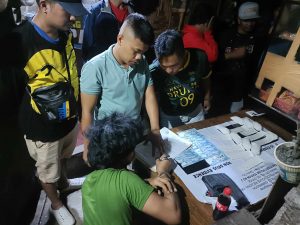AROUND 600 public transport drivers, conductors, and barkers underwent drug screening in the region-wide implementation of the Philippine Drug Enforcement Agency (PDEA) Oplan Harabas on Friday, Oct. 27.
In an interview at the Davao City Overland Transport Terminal, PDEA XI director Naravy Duquiatan said about 200 drivers and conductors at DCOTT, 100 at the van terminal in Gaisano Mall Bajada, 200 in Tagum City Terminal, and 100 in Digos City submitted urine samples for testing.
Oplan Harabas was led by PDEA XI, DCOTT, Land Transportation Office XI, and Land Transportation Franchising and Regulatory Board (LTFRB) XI.
“[This activity] is In line with the implementation of RA 10586 or Anti-Drunk and Drugged Driving Act of 2013,” Duquiatan said.
“So far, we cannot give the official report if naa mag positive subject to the confirmatory test,” she said.
Also, DCOTT manager Aisa Usop said they are grateful for the program to ensure passenger safety.
“We have to remember that the life of passenger naga agad sa driver,” Yusop said.
The LTO XI may revoke the driver’s license of anyone who tests positive or those who refuse the drug test.
The drug test was conducted on major terminals for buses, jeepneys, tricycles, and public utility vehicles throughout the country in preparation for Undas.
According to PDEA, they must undergo appropriate intervention and reformation programs to be provided by their respective local Barangay Anti-Drug Abuse Councils (BADACs) before they can be allowed to reclaim their licenses.
Oplan Harabas was implemented according to the provisions of Republic Act 9165, or The Comprehensive Dangerous Act of 2002,” and Republic Act No.10586, or the “Anti-Drunk and Drugged Driving Act of 2013,” as well as Dangerous Drugs Board (DDB) Regulation No. 2 Series of 2004, aimed to curb road accidents caused by drugged drivers.




